高三英语复习:倒装句 课件
图片预览
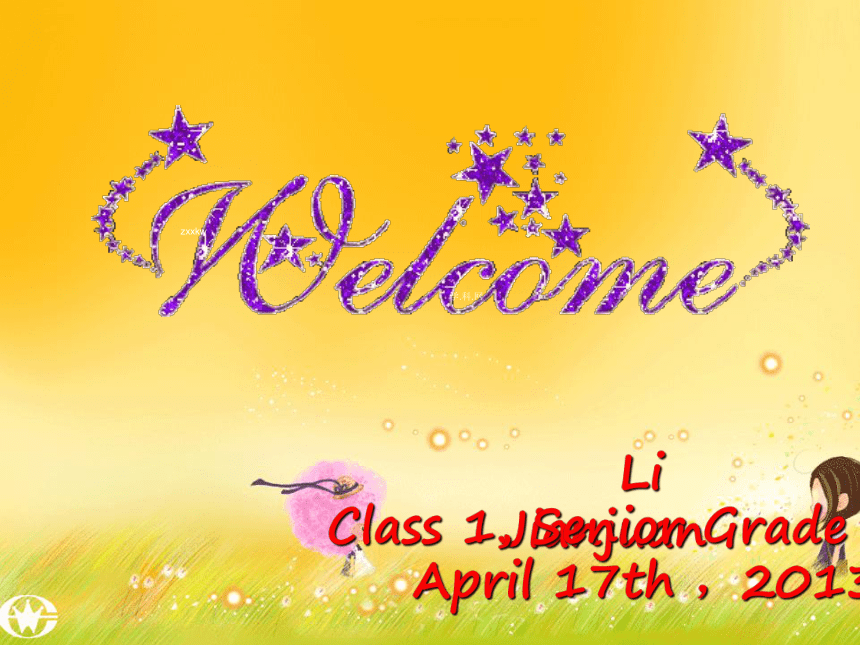

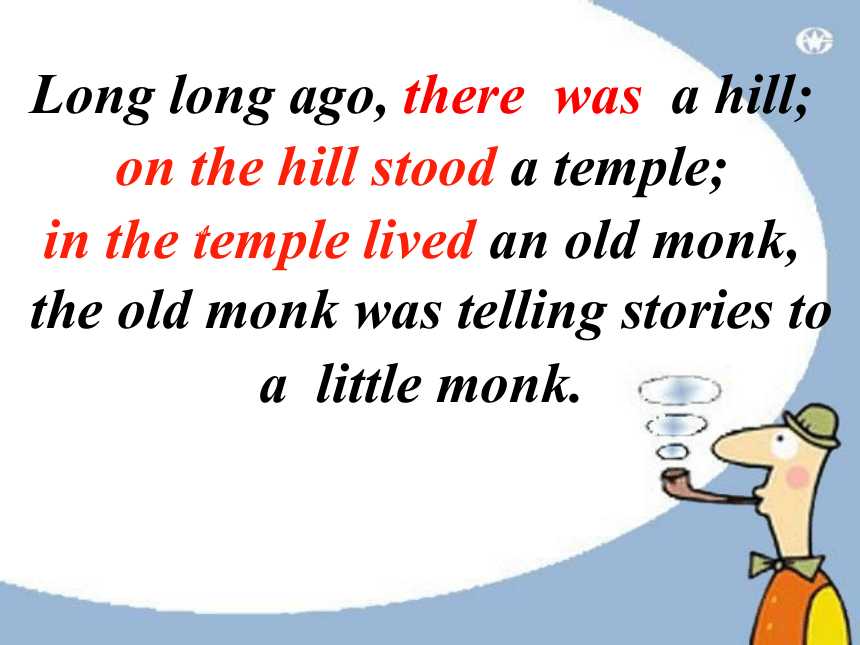
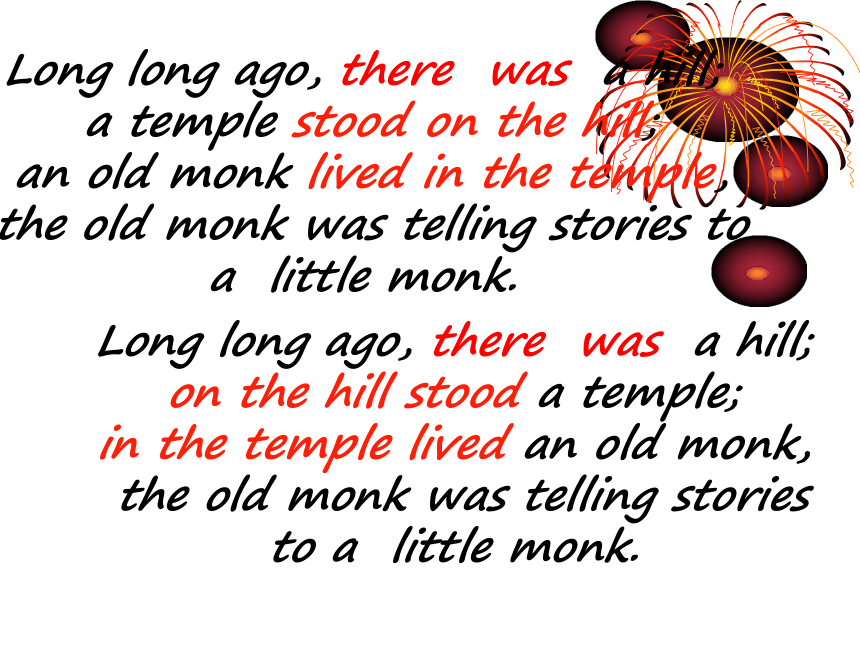

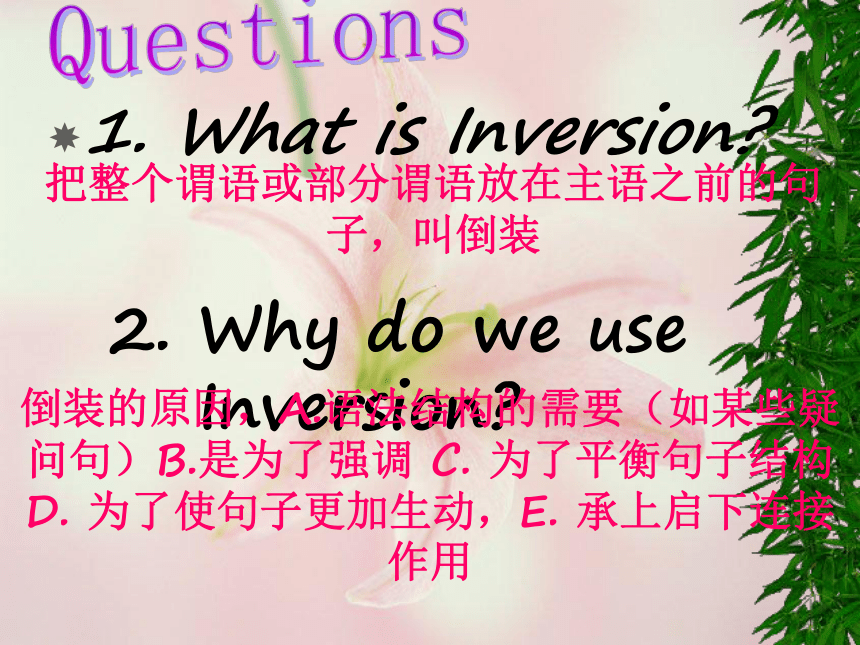
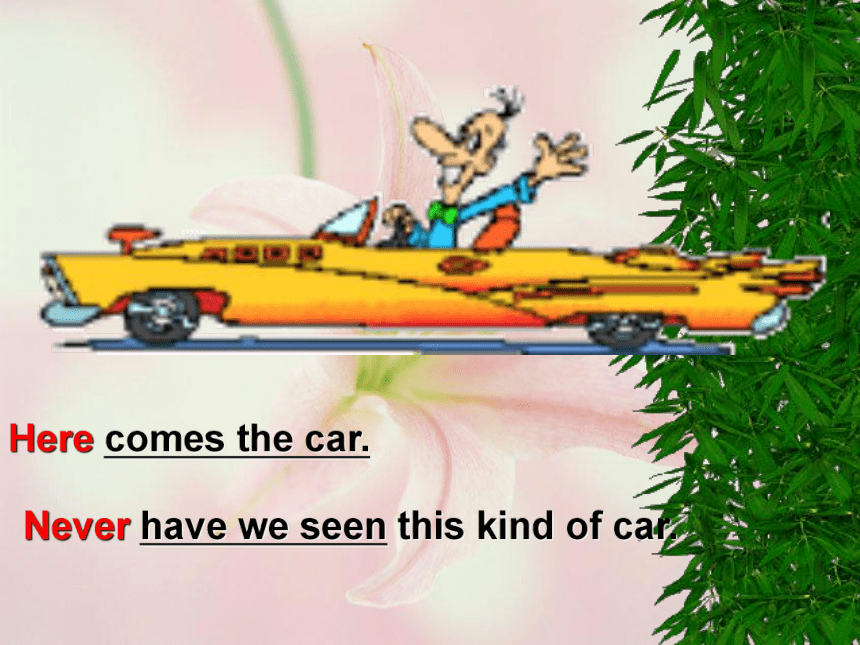
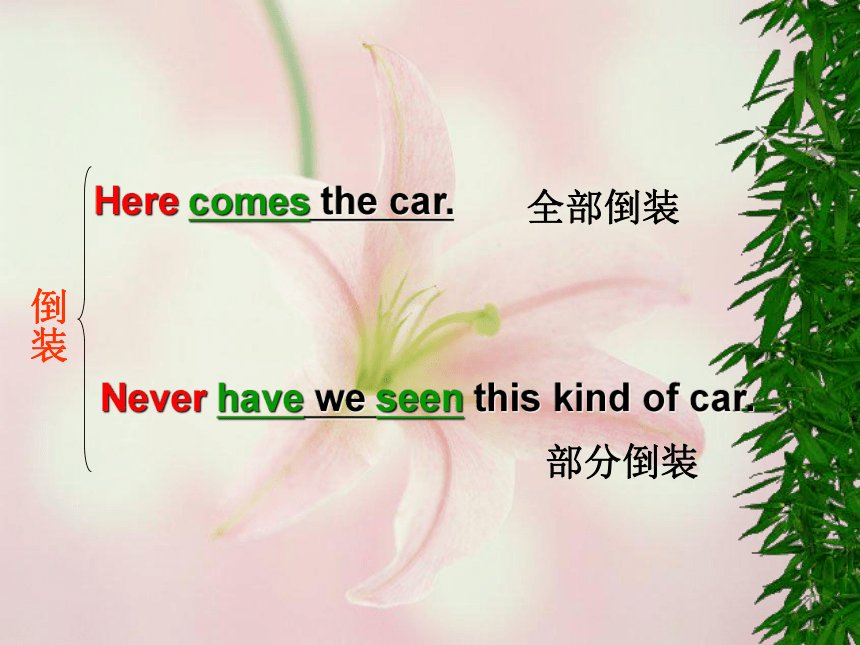
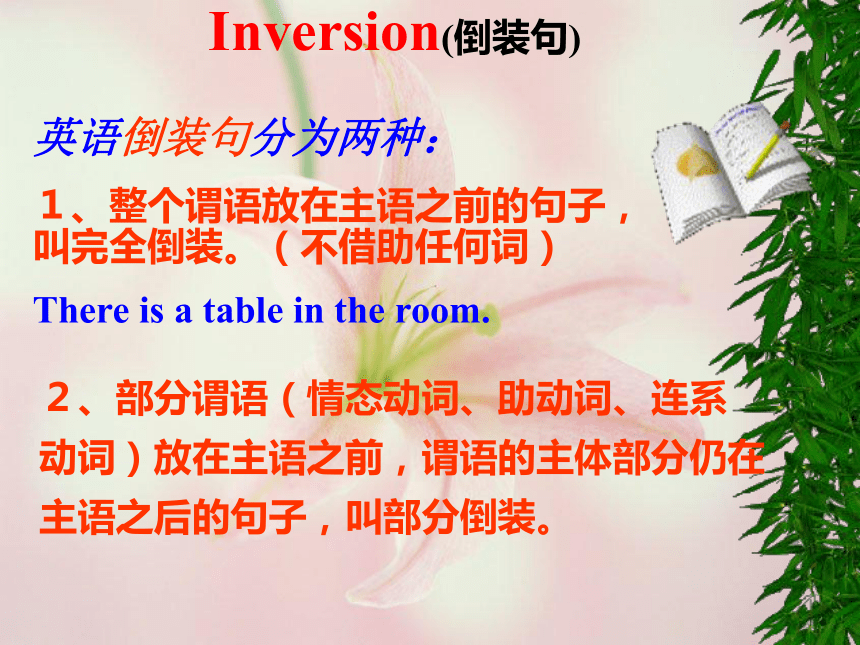
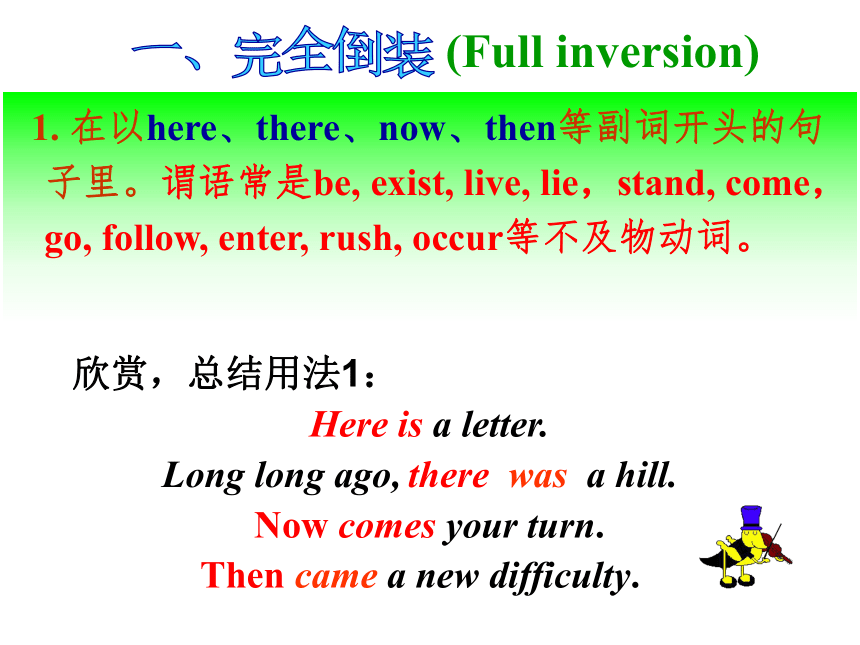

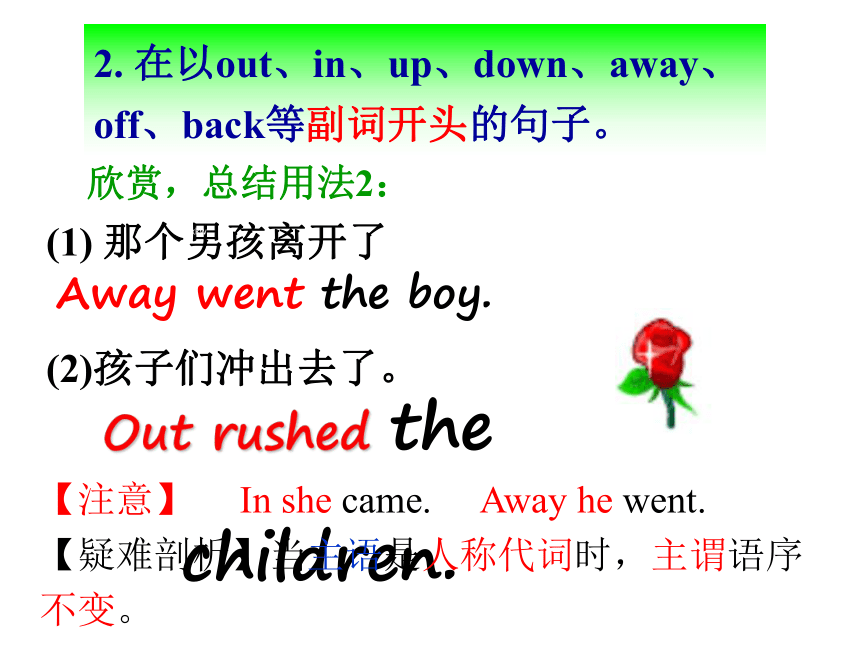
文档简介
课件53张PPT。 Li JianjuanClass 1, Senior Grade 3April 17th ,2013zxxkw学.科.网 Enjoy the following story : Long long ago, there was a hill; a temple stood on the hill; an old monk lived in the temple, the old monk was telling stories to a little monk.
What stories was he telling?Long long ago, there was a hill; on the hill stood a temple; in the temple lived an old monk, the old monk was telling stories to a little monk.
zxxkwLong long ago, there was a hill; a temple stood on the hill; an old monk lived in the temple, the old monk was telling stories to a little monk.
Long long ago, there was a hill; on the hill stood a temple; in the temple lived an old monk, the old monk was telling stories to a little monk.
Inversion
(倒装句)
学.科.网1. What is Inversion?
Questions 2. Why do we use Inversion?把整个谓语或部分谓语放在主语之前的句子,叫倒装倒装的原因,A.语法结构的需要(如某些疑问句)B.是为了强调 C. 为了平衡句子结构 D. 为了使句子更加生动,E. 承上启下连接作用
Here comes the car.Never have we seen this kind of car.
zxxkw倒装Here comes the car.
Never have we seen this kind of car. 全部倒装部分倒装Inversion(倒装句)英语倒装句分为两种:
1、整个谓语放在主语之前的句子,叫完全倒装。(不借助任何词)
There is a table in the room.2、部分谓语(情态动词、助动词、连系
动词)放在主语之前,谓语的主体部分仍在
主语之后的句子,叫部分倒装。 1. 在以here、there、now、then等副词开头的句子里。谓语常是be, exist, live, lie,stand, come,go, follow, enter, rush, occur等不及物动词。 一、完全倒装 欣赏,总结用法1:
Here is a letter.
Long long ago, there was a hill.
Now comes your turn.
Then came a new difficulty.
(Full inversion)【注意】
Here you are. Here it is. Here they are.
【疑难剖析】当主语是人称代词(I,he,she,it,we,they,you)时,主谓语序不变。巩固练习:
---- Here ____! Where is Xiao Liu?
---- There ____.
A. comes the bus, is he
B. comes the bus, he is
C. the bus comes, is he
D. the bus comes, he is 2. 在以out、in、up、down、away、off、back等副词开头的句子。(1) 那个男孩离开了
(2)孩子们冲出去了。欣赏,总结用法2:
Out rushed the children. 【注意】 In she came. Away he went.
【疑难剖析】当主语是人称代词时,主谓语序不变。Away went the boy.zxxkw欣赏,总结用法3:
一只小狗坐在房间外。
A little dog sits outside the room.
3.表示地点的介词短语提前位于句首时,全部倒装。Outside the room sits a little dog.
In the temple lived an old monk.Here _________! Here __________.
A. is the chips; you are
B. are the chips; you are
C. the chips is; you are
D. the chips are; you are
1,2两种结构通常只用于一般现在时和一般过去时。 you
I, we, he, she, they, it
●Here you are.
● Here it is.
● In he comes.在上面三种结构中,如果主语为人称代词,则不需要倒装。4某些表语位于句首1)表语为介词短语
Among the goods are Christmas trees, flowers, candles and toys.2)表语为形容词
Present at the meeting were Mr White and many other guests.4)表语为进行时态中的现在分词
Lying on the floor was a boy.
Standing beside the desk was a teacher.3)表语为过去分词
Seated on the ground are a group of young people. 3.Under a big tree ____.
A. did sat a fat man B. a fat man sat
C. did a fat man sat D. sat a fat man In the dark forests ________, some large enough to hold several boats.
A.stand many lakes B.many lakesestand
C do many lakes stand D.stands many lakes 1. The child tiptoed(翘起脚尖走) quietly to the bird.__into the forest when he was about to catch it.
A.Flew it away? ? B.Away flew it ??
C.Away it flew ?? D.Flew away it 2. ______ when we Chinese people must depend on others
A. The days gone are forever B. Are the days gone forever
C. Gone forever are the days D. Forever go the days 部分倒装是指将谓语的一部分如助动词(has/have/had)、情态动词(can/could/may/might...)或be(am/is/are)提至主语之前即可。
如果句中的谓语中没有助动词、系动词或情态动词,则需根据句子时态借助 助动词do, does或did并将其置于主语之前,再把句子的动词还原。
部分倒装句子结构:
情态动词(can/could...)/助动词(has/have/had/do/does/did)/系动词(am/is/are)+主语+V+其他...(注意:部分倒装与句子的主语是代词与否无关。)
二、部分倒装(Partial inversion)waswerewaswerea 、 I realized my mistakes only then.
b、We can succeed only by working hard.
练习:
You will make progress only in this way.
1.以only修饰的副词、介词短语放句首时,要部分倒装。
欣赏,总结用法4:
Only then did I realize my mistakes. Only by working hard can we succeed.
Only in this way will you make progress.注意: 当only修饰主语放句首时, 不倒装。(2) only+when/after等引导的时间状语从句位于句首时,部分倒装。注意:主倒从不倒。
?只有你才能克服这种困难。
Only you can overcome the difficulty.
I was able to see him only after he came back.Only after he came back was I able to see him.
1. Only when class began ____ that he had left his book at home.
A. will realize B. he did realize
C. did he realize D. should he realize2. Only when ____me ,____it.
A. did he tell, did I know
B. did he tell, I knew
C. he told, did I know
D. he told, I knew
*他一点也不关心自己的安全。He cared little about his own safety. Little did he care about his own safety.*我以前从不看报纸。
Never have I read newspapers before.2. 当句首为否定词或带有否定含义的词语、短语时,常见的这类词有not, never, hardly, seldom, rarely,little,in no way, by no means 等。I have never read newspapers before*我很少去看电影.
I seldom go to the cinema.
Seldom do I go to the cinema.高考真题再现:
1. I’ve tried very hard to improve my English. But by no means _____ with my progress.
the teacher is not satisfied
is the teacher not satisfied
the teacher is satisfied
D. is the teacher satisfied
D
2. Not a single mistake ____ in the dictation yesterday.
A. did he make B. made by him
C. he made D. he had made 3. I finally got the job. Never in all my life___ so happy.
A. did I feel B. I felt
C. I had felt D. had I felt (3)not until 引导的从句位于句首引起的主句部分倒装直到他的妈妈回来,他才完成作业。 He didn’t finish his homework until his mother came back. Not until his mother came back did he finish his homework.主倒从不倒等到孩子睡着了,妈妈才离开房间.
The mother didn’t leave the room until the child fell asleep.
当Not until引出主从复合句,主句倒装,从句不倒装。Not until the child fell asleep did the mother leave the room.练习:1)Not until I began to work ___how much time I had wasted.
A) I realized
B) did I realize
C) I did realize
D)had I realized
虽然我很丑,但是我很温柔Although / Though I am ugly, I am gentle.
as / thoughUglyI am, I am gentle.
虽然他是个孩子,他不得不自己谋生Though he is a child, he has to make a living.Child as he is, he has to make a living.
注意:从句的表语是名词,其名词前不加任何冠词
4、as/ though (虽然,尽管)引导的让步状语从句:名词形容词副词动词分词+asthough+主语+其他
Though I like you much, I will never marry you .
Much as I like you , I will never marry you .
Although she might try, she could not pass the exam.
Try though she might , she could not pass the exam.
Though he was surrounded by the enemy, he was not afraid.
Surrounded though he was by the enemy, he was not afraid.
_______, his idea was accepted by all the people at the meeting.
A. Strange as might it sound
B. As it might sound strange
C. As strange it might sound
D. Strange as it might sound 5.用于so / nor / neither 开头的句子此类倒装用于重复前句部分内容
前句是肯定句用so 某人/某事也是
前句是否定句用neither / nor某人/某事也不是
倒装句中的谓语应与前句的谓语时态形态一致He has been to Beijing. So have I.
Tom can’t answer the question. Neither /Nor can I . So +be/助动词/情态动词+主语
某人也是如此
Nor/neither +be/助动词/情态动词+主语
某人也不是如此 So +主语+be/助动词/情态动词
某人确实如此
如果前一句有两种动词形式,或有肯定又有否定,用 So it is with…/ It is the same with …表情况也适合另一个人
Betty is a nice girl. So she is .
Betty is a nice girl. So are you.
Betty is a nice girl and studies very hard, so it is with you.
2. 他喜欢读书,我也是.
He likes reading very much. So do I .
3. 我从来没有去过广州大学,他也没去过.
I have never been to Guangzhou University, neither/ nor has he.
1. ---Do you know Jim quarreled with his brother?
---I don’t know, _______.
A. nor don’t I care
B. nor do I care
C. I don’t care neither
D. I don’t care also配套练习Ⅰ. Multiple choices.易错题:
1、I wonder if your wife will go to the ball. If your wife _____, so _____ mine.
does , will B. will, does
C. will, would D. does, do
2、--I seldom watch TV, but listen to the radio a lot.
-- _____.
So do I B. Neither do I
C. So I have D. So it is with me.AD 6.在 hardly/scarcely/…when; no sooner…than; not only … but also;so...that; such…that 的倒装句中,前倒后不倒.
hardly/scarcely/ no sooner后句子的谓语用had done, when/than后句子的谓语用一般过去时 (3) Not only is he interested in football but
also he plays it well. (1) Hardly / Scarcely had he fallen asleep when a
loud knock at the door awaked him.
(2) No sooner had I reached the station than train
moved.(4)So hard does he work that he has made great
progress in English.典型例题: No sooner___ than it began to rain heavily. A. the game began
B. has the game begun C. did the game begin
D. had the game begunNot only __ a promise, but also kept it.
A. had he made B. he had made
C. did he make D. he makes
7. If 虚拟条件从句中.从句有(were/should/had)(1)If I were you, I would work hard.
(2) If it should rain tomorrow, we would put off
our meeting.
(3)If he had followed my advice, he would have
succeeded.Were I you, I would work hard. Should it rain tomorrow, we would put
off our meeting. Had he followed my advice, he would
have succeeded. ? Were it not for his teacher’s help, he would never graduate from this high school. 注意:我们可以说Were it not...或者Had it not been..., 但不可以说Weren’ t it... 或者hadn’t it been... If it were not for his teacher’s help, he would never graduate from this high school. _______five minutes earlier, you could have seen
them off.A. If you should arrive B. If you arrive
C. Had you arrived D. Should you arriveC(8)May置句首,表示祝愿。
May we succeed. 祝我们成功!(9)在表示愿望的感叹句,倒装。
Long live Chairman Mao !倒装倒装句的高考考点:全部倒装部分倒装1. 在以here、there、now、then、off、away等副词开头的句子里。 2. 表示地点的介词短语位于句首时。1. Only+状语位于句首时2. 否定副词或短语位于句首时 3. Not until…放句首时4、So Neither Nor 位于句首时5、as引导的让步状语从句8、特殊句式 3. 表语提前时6. 在 hardly/scarcely/…when; no sooner…than; not only … but also;so...that; such…that 的倒装句中,前倒后不倒.
7.在省去if的虚拟条件从句 中 Translation虽然他是个孩子,但他懂得很多。
只有用这种方式我们才能提高我们的英语水平。
直到他失去健康,他才意识到好的身体意味着什么。Child as he is, he knows a lot. Only in this way can we improve our English. Not until he lost his health did he realize what good health meant. 高考
链接Have a challenge 1. Not until all the fish died in the river ____
how serious the pollution was. did the villagers realize
B. the villagers realizedC. the villagers realized
D. didn’t the villagers realize 2. Only in this way _____ to make
improvement in the operating system.
you can hope B. you did hope
C. can you hope D. did you hope 3. If Joe’s wife don’t go to the party,
____.
A. he will either B. neither will he
C. he neither will D. either he will
4. — My room gets very cold at night.
— ___________.
A. So is mine B. So mine is
C. So does mine D. So mine does5. Not a single song _____ at yesterday’s
party. A. she sang B. sang she
C. did she sing D. she did sing6. —It was careless of you to have left your
clothes outside all night. —My God! ______. A. So did I B. So I did
C. So were you D. So did you7. I finally got the job I dreamed about.
Never in all my life so happy______. did I feel B. I felt
C. I had felt D. had I felt 8. Maybe you have been to many countries,
but nowhere else?________?such a
beautiful palace. A. can you find ? B. you could find ?
C. you can find ? D. could you find Homework :
1.Remember the usage of
inversion;
2.Complete your paper.Thank you!
Inversion
(倒装句)
学.科.网1. What is Inversion?
Questions 2. Why do we use Inversion?把整个谓语或部分谓语放在主语之前的句子,叫倒装倒装的原因,A.语法结构的需要(如某些疑问句)B.是为了强调 C. 为了平衡句子结构 D. 为了使句子更加生动,E. 承上启下连接作用
Here comes the car.Never have we seen this kind of car.
zxxkw倒装Here comes the car.
Never have we seen this kind of car. 全部倒装部分倒装Inversion(倒装句)英语倒装句分为两种:
1、整个谓语放在主语之前的句子,叫完全倒装。(不借助任何词)
There is a table in the room.2、部分谓语(情态动词、助动词、连系
动词)放在主语之前,谓语的主体部分仍在
主语之后的句子,叫部分倒装。 1. 在以here、there、now、then等副词开头的句子里。谓语常是be, exist, live, lie,stand, come,go, follow, enter, rush, occur等不及物动词。 一、完全倒装 欣赏,总结用法1:
Here is a letter.
Long long ago, there was a hill.
Now comes your turn.
Then came a new difficulty.
(Full inversion)【注意】
Here you are. Here it is. Here they are.
【疑难剖析】当主语是人称代词(I,he,she,it,we,they,you)时,主谓语序不变。巩固练习:
---- Here ____! Where is Xiao Liu?
---- There ____.
A. comes the bus, is he
B. comes the bus, he is
C. the bus comes, is he
D. the bus comes, he is 2. 在以out、in、up、down、away、off、back等副词开头的句子。(1) 那个男孩离开了
(2)孩子们冲出去了。欣赏,总结用法2:
Out rushed the children. 【注意】 In she came. Away he went.
【疑难剖析】当主语是人称代词时,主谓语序不变。Away went the boy.zxxkw欣赏,总结用法3:
一只小狗坐在房间外。
A little dog sits outside the room.
3.表示地点的介词短语提前位于句首时,全部倒装。Outside the room sits a little dog.
In the temple lived an old monk.Here _________! Here __________.
A. is the chips; you are
B. are the chips; you are
C. the chips is; you are
D. the chips are; you are
1,2两种结构通常只用于一般现在时和一般过去时。 you
I, we, he, she, they, it
●Here you are.
● Here it is.
● In he comes.在上面三种结构中,如果主语为人称代词,则不需要倒装。4某些表语位于句首1)表语为介词短语
Among the goods are Christmas trees, flowers, candles and toys.2)表语为形容词
Present at the meeting were Mr White and many other guests.4)表语为进行时态中的现在分词
Lying on the floor was a boy.
Standing beside the desk was a teacher.3)表语为过去分词
Seated on the ground are a group of young people. 3.Under a big tree ____.
A. did sat a fat man B. a fat man sat
C. did a fat man sat D. sat a fat man In the dark forests ________, some large enough to hold several boats.
A.stand many lakes B.many lakesestand
C do many lakes stand D.stands many lakes 1. The child tiptoed(翘起脚尖走) quietly to the bird.__into the forest when he was about to catch it.
A.Flew it away? ? B.Away flew it ??
C.Away it flew ?? D.Flew away it 2. ______ when we Chinese people must depend on others
A. The days gone are forever B. Are the days gone forever
C. Gone forever are the days D. Forever go the days 部分倒装是指将谓语的一部分如助动词(has/have/had)、情态动词(can/could/may/might...)或be(am/is/are)提至主语之前即可。
如果句中的谓语中没有助动词、系动词或情态动词,则需根据句子时态借助 助动词do, does或did并将其置于主语之前,再把句子的动词还原。
部分倒装句子结构:
情态动词(can/could...)/助动词(has/have/had/do/does/did)/系动词(am/is/are)+主语+V+其他...(注意:部分倒装与句子的主语是代词与否无关。)
二、部分倒装(Partial inversion)waswerewaswerea 、 I realized my mistakes only then.
b、We can succeed only by working hard.
练习:
You will make progress only in this way.
1.以only修饰的副词、介词短语放句首时,要部分倒装。
欣赏,总结用法4:
Only then did I realize my mistakes. Only by working hard can we succeed.
Only in this way will you make progress.注意: 当only修饰主语放句首时, 不倒装。(2) only+when/after等引导的时间状语从句位于句首时,部分倒装。注意:主倒从不倒。
?只有你才能克服这种困难。
Only you can overcome the difficulty.
I was able to see him only after he came back.Only after he came back was I able to see him.
1. Only when class began ____ that he had left his book at home.
A. will realize B. he did realize
C. did he realize D. should he realize2. Only when ____me ,____it.
A. did he tell, did I know
B. did he tell, I knew
C. he told, did I know
D. he told, I knew
*他一点也不关心自己的安全。He cared little about his own safety. Little did he care about his own safety.*我以前从不看报纸。
Never have I read newspapers before.2. 当句首为否定词或带有否定含义的词语、短语时,常见的这类词有not, never, hardly, seldom, rarely,little,in no way, by no means 等。I have never read newspapers before*我很少去看电影.
I seldom go to the cinema.
Seldom do I go to the cinema.高考真题再现:
1. I’ve tried very hard to improve my English. But by no means _____ with my progress.
the teacher is not satisfied
is the teacher not satisfied
the teacher is satisfied
D. is the teacher satisfied
D
2. Not a single mistake ____ in the dictation yesterday.
A. did he make B. made by him
C. he made D. he had made 3. I finally got the job. Never in all my life___ so happy.
A. did I feel B. I felt
C. I had felt D. had I felt (3)not until 引导的从句位于句首引起的主句部分倒装直到他的妈妈回来,他才完成作业。 He didn’t finish his homework until his mother came back. Not until his mother came back did he finish his homework.主倒从不倒等到孩子睡着了,妈妈才离开房间.
The mother didn’t leave the room until the child fell asleep.
当Not until引出主从复合句,主句倒装,从句不倒装。Not until the child fell asleep did the mother leave the room.练习:1)Not until I began to work ___how much time I had wasted.
A) I realized
B) did I realize
C) I did realize
D)had I realized
虽然我很丑,但是我很温柔Although / Though I am ugly, I am gentle.
as / thoughUglyI am, I am gentle.
虽然他是个孩子,他不得不自己谋生Though he is a child, he has to make a living.Child as he is, he has to make a living.
注意:从句的表语是名词,其名词前不加任何冠词
4、as/ though (虽然,尽管)引导的让步状语从句:名词形容词副词动词分词+asthough+主语+其他
Though I like you much, I will never marry you .
Much as I like you , I will never marry you .
Although she might try, she could not pass the exam.
Try though she might , she could not pass the exam.
Though he was surrounded by the enemy, he was not afraid.
Surrounded though he was by the enemy, he was not afraid.
_______, his idea was accepted by all the people at the meeting.
A. Strange as might it sound
B. As it might sound strange
C. As strange it might sound
D. Strange as it might sound 5.用于so / nor / neither 开头的句子此类倒装用于重复前句部分内容
前句是肯定句用so 某人/某事也是
前句是否定句用neither / nor某人/某事也不是
倒装句中的谓语应与前句的谓语时态形态一致He has been to Beijing. So have I.
Tom can’t answer the question. Neither /Nor can I . So +be/助动词/情态动词+主语
某人也是如此
Nor/neither +be/助动词/情态动词+主语
某人也不是如此 So +主语+be/助动词/情态动词
某人确实如此
如果前一句有两种动词形式,或有肯定又有否定,用 So it is with…/ It is the same with …表情况也适合另一个人
Betty is a nice girl. So she is .
Betty is a nice girl. So are you.
Betty is a nice girl and studies very hard, so it is with you.
2. 他喜欢读书,我也是.
He likes reading very much. So do I .
3. 我从来没有去过广州大学,他也没去过.
I have never been to Guangzhou University, neither/ nor has he.
1. ---Do you know Jim quarreled with his brother?
---I don’t know, _______.
A. nor don’t I care
B. nor do I care
C. I don’t care neither
D. I don’t care also配套练习Ⅰ. Multiple choices.易错题:
1、I wonder if your wife will go to the ball. If your wife _____, so _____ mine.
does , will B. will, does
C. will, would D. does, do
2、--I seldom watch TV, but listen to the radio a lot.
-- _____.
So do I B. Neither do I
C. So I have D. So it is with me.AD 6.在 hardly/scarcely/…when; no sooner…than; not only … but also;so...that; such…that 的倒装句中,前倒后不倒.
hardly/scarcely/ no sooner后句子的谓语用had done, when/than后句子的谓语用一般过去时 (3) Not only is he interested in football but
also he plays it well. (1) Hardly / Scarcely had he fallen asleep when a
loud knock at the door awaked him.
(2) No sooner had I reached the station than train
moved.(4)So hard does he work that he has made great
progress in English.典型例题: No sooner___ than it began to rain heavily. A. the game began
B. has the game begun C. did the game begin
D. had the game begunNot only __ a promise, but also kept it.
A. had he made B. he had made
C. did he make D. he makes
7. If 虚拟条件从句中.从句有(were/should/had)(1)If I were you, I would work hard.
(2) If it should rain tomorrow, we would put off
our meeting.
(3)If he had followed my advice, he would have
succeeded.Were I you, I would work hard. Should it rain tomorrow, we would put
off our meeting. Had he followed my advice, he would
have succeeded. ? Were it not for his teacher’s help, he would never graduate from this high school. 注意:我们可以说Were it not...或者Had it not been..., 但不可以说Weren’ t it... 或者hadn’t it been... If it were not for his teacher’s help, he would never graduate from this high school. _______five minutes earlier, you could have seen
them off.A. If you should arrive B. If you arrive
C. Had you arrived D. Should you arriveC(8)May置句首,表示祝愿。
May we succeed. 祝我们成功!(9)在表示愿望的感叹句,倒装。
Long live Chairman Mao !倒装倒装句的高考考点:全部倒装部分倒装1. 在以here、there、now、then、off、away等副词开头的句子里。 2. 表示地点的介词短语位于句首时。1. Only+状语位于句首时2. 否定副词或短语位于句首时 3. Not until…放句首时4、So Neither Nor 位于句首时5、as引导的让步状语从句8、特殊句式 3. 表语提前时6. 在 hardly/scarcely/…when; no sooner…than; not only … but also;so...that; such…that 的倒装句中,前倒后不倒.
7.在省去if的虚拟条件从句 中 Translation虽然他是个孩子,但他懂得很多。
只有用这种方式我们才能提高我们的英语水平。
直到他失去健康,他才意识到好的身体意味着什么。Child as he is, he knows a lot. Only in this way can we improve our English. Not until he lost his health did he realize what good health meant. 高考
链接Have a challenge 1. Not until all the fish died in the river ____
how serious the pollution was. did the villagers realize
B. the villagers realizedC. the villagers realized
D. didn’t the villagers realize 2. Only in this way _____ to make
improvement in the operating system.
you can hope B. you did hope
C. can you hope D. did you hope 3. If Joe’s wife don’t go to the party,
____.
A. he will either B. neither will he
C. he neither will D. either he will
4. — My room gets very cold at night.
— ___________.
A. So is mine B. So mine is
C. So does mine D. So mine does5. Not a single song _____ at yesterday’s
party. A. she sang B. sang she
C. did she sing D. she did sing6. —It was careless of you to have left your
clothes outside all night. —My God! ______. A. So did I B. So I did
C. So were you D. So did you7. I finally got the job I dreamed about.
Never in all my life so happy______. did I feel B. I felt
C. I had felt D. had I felt 8. Maybe you have been to many countries,
but nowhere else?________?such a
beautiful palace. A. can you find ? B. you could find ?
C. you can find ? D. could you find Homework :
1.Remember the usage of
inversion;
2.Complete your paper.Thank you!
同课章节目录
- 名词
- 动词/动词短语
- 一般现在时及其被动式
- 一般过去时及其被动式
- 现在进行时及其被动式
- 过去进行时及其被动式
- 将来进行时及其被动式
- 现在完成时及其被动式
- 过去完成时及其被动式
- 一般将来时及其被动式
- 过去将来时及其被动式
- 现在完成进行时及其被动式
- 将来完成时及其被动式
- 副词
- 介词/介词短语
- 连词/连接词
- 数词/量词
- 冠词
- 形容词
- 非谓语动词
- 句型
- 简单句与并列句
- 复合句
- 主谓一致
- 倒装与省略
- 强调句
- 虚拟语气
- 插入语
- 固定句型
- 祈使句/感叹句
- 疑问句/反义疑问句
- 非限制性定语从句
- 句型转换
- 定语从句
- 表语从句
- 宾语从句
- 主语从句
- 动词时态与语态
- 虚拟语气与情态动词
- 主谓一致
- 独立主格结构、with的复合结构
- 情态动词
- 状语从句
- 定语从句
- 特殊句式
- 交际用语
- 代词/不定代词
- 名词性从句
- 同位语从句
- 表语从句
- 宾语从句
- 主语从句
- 直接引语和间接引语
- 构词法(word formation)
